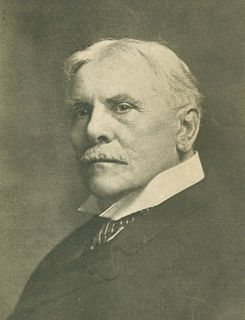A Quote by Martin Luther
Hereby we may understand that God, of His special grace, maketh the teachers of the gospel subject to the Cross, and to all kinds of afflicitons, for the salvation of themselves and of the people; for otherwise they could by no means beat down this beast which is called vain-glory.
Related Quotes
There is no better test as to whether a man is really preaching the New Testament gospel of salvation than the fact that some people might misunderstand it and misinterpret it to mean that it really amounts to this–that because you are saved by grace alone it does not matter at all what you do, that you can go on sinning as much as you like because it will abound all the more to the glory of grace. That is a very good test of gospel preaching. If my preaching and presentation of the gospel of salvation does not expose it to that misunderstanding, then it is not the gospel.
Those who understand the cross increasingly see their sin as God does, and therefore begin to feelabout sin as does God. We begin to mourn for and hate it. In other words, at the cross God becomes larger and we become smaller. This separation is at the heart of the fear of God. This "fear" opens God's wisdom to us because only in light of God's immensity can I see the importance of living for the right end, his glory. And only in the light of my smallness can I feel overawed by the means he used to save me, his cross.
If a person has grasped the meaning of God's grace in his heart, he will do justice. If he doesn't live justly, then he may say with his lips that he is grateful for God's grace, but in his heart he is far from him. If he doesn't care about the poor, it reveals that at best he doesn't understand the grace he has experienced, and at worst he has not really encountered the saving mercy of God. Grace should make you just.
Remember that each of us has his own cross. The Golgotha of this cross is our heart: it is being lifted or implanted through a zealous determination to live according to the Spirit of God. Just as salvation of the world is by the Cross of God, so our salvation is by our crucifixion on our own cross.
When you blow it, God still celebrates His Son in you. The litmus test of whether or not you understand the gospel is what you do when you fail. Do you run from Him and go clean yourself up a little bit before you come back into the throne room? Or do you approach the throne of grace with confidence? If you don't approach the throne of grace with confidence, you don't understand the gospel.
If a preacher is cultured, gentle, earnest, intellectual, and broadly tolerant, the sheep of God run after him. He, of course, speaks beautifully about Christ, and uses the old words redemption, the cross, even sacrifice and atonement-but what is his Gospel? That is the crucial question. Is salvation, perfect, entire, eternal,-justification, sanctification, glory,-the alone work of Christ, and the free gift of God to faith alone?
We want to fan the flames of Christians for whom inerrancy and the authority of Scripture are not mere shibboleths, but part of her life beat, part of the beating heart of what makes them tick. They revere Scripture, not because Scripture becomes an idol, but because it discloses God who is especially come after us in salvation and redemption through the person of his son, his cross, his resurrection, the full sweep of the gospel.
Whilst a man is persuaded that he has it in his power to contribute anything, be it ever so little, to his salvation, he remains in carnal self-confidence; he is not a self-despairer, and therefore is not duly humbled before God, he believes he may lend a helping hand in his salvation, but on the contrary, whoever is truly convinced that the whole work depends singly on the will of God, such a person renounces his own will and strength; he waits and prays for the operation of God, nor waits and prays in vain
Many biblical passages teach that we're not saved by our own efforts but by the grace of God alone. But the same passages also tell us good works are an essential evidence of the salvation experience. We're not saved by good works, but for good works. It begins with God's grace, and it's sustained by his grace as you shape your character by what you do as you cross the bridge.








































